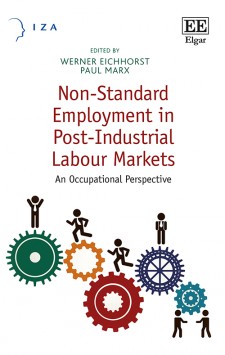Mongelli, Francesco Paolo, Reinhold, Elisa, Papadopoulos, Georgios, (2016), “What’s so special about specialization in the euro area? – Early evidence of changing economic structures”, European Central Bank, Occasional Paper Series, No 168, February. Euro area countries exhibited modest convergence prior to the financial crisis and diverged thereafter. Such divergence has been examined from many angles, and various narratives of the crisis have developed. Surprisingly, the gradual transformation of the economic structures of euro area countries over …Read More
Cross-Border Banking and Business Cycles in Asymmetric Currency Unions
Dräger, Lena, Proaño, Christian R., (2016), “Cross-Border Banking and Business Cycles in Asymmetric Currency Unions”, IMK Working Paper, Nr. 161, January. Against the background of the emergence of macroeconomic imbalances within the European Monetary Union (EMU), we investigate in this paper the macroeconomic consequences of cross-border banking in monetary unions such as the euro area. For this purpose, we incorporate in an otherwise standard two-region monetary union DSGE model a global banking sector …Read More
Economic Policy Reforms 2016
OECD, (2016), “Economic Policy Reforms 2016-Going for Growth Interim Report”, OECD Publishing, 26 February. Going for Growth is the OECD’s regular report on structural reforms in policy areas that have been identified as priorities to boost incomes in OECD and selected non-OECD countries (Brazil, China, Colombia, India, Indonesia, Latvia, Russian Federation and South Africa). Policy priorities are updated every two years and presented in a full report, which includes individual country notes with …Read More
The king is dead – long live the king: what follows after the Troika?
Müller, Torsten, (2016), “The king is dead – long live the king: what follows after the Troika?”, Working Paper 2015.09, European Trade Union Institute, February. The focus of this paper is the need to reshape the financial assistance programmes and the related activities of the Troika in a way that would make them more socially and democratically acceptable. The starting point, therefore, is an analysis of the current role of the Troika and …Read More
Non-Standard Employment in Post-Industrial Labour Markets-An Occupational Perspective
Eichhorst, Werner, Marx, Paul, (2015), “Non-Standard Employment in Post-Industrial Labour Markets-An Occupational Perspective”, IZA, Edward Elgar Publishing. Examining the occupational variation within non-standard employment, this book combines case studies and comparative writing to illustrate how and why alternative occupational employment patterns are formed. Non-standard employment has grown significantly in most developed economies, varying between countries. Different institutional settings have been deemed accountable for this variation, although inadequate consideration has been given to differences within national …Read More
Lending-of-last-resort is as lending-of-last-resort does: Central bank liquidity provision and interbank market functioning in the euro area
Garcia-de-Andoain, Carlos, Heider, Florian, Hoerova, Marie, Manganelli, Simone, (2016), “Lending-of-last-resort is as lending-of-last-resort does: Central bank liquidity provision and interbank market functioning in the euro area“, European Central Bank Working Paper, No 1886, February. This paper investigates the impact of ample liquidity provision by the European Central Bank on the functioning of the overnight unsecured interbank market from 2008 to 2014. We use novel data on interbank transactions derived from TARGET2, the main euro area payment …Read More
Which fiscal union for the euro area?
Bénassy-Quéré, Agnès, Ragot, Xavier, Wolff, Guntram B., (2016), “Which fiscal union for the euro area?“, Bruegel Publications, Issue 2016/05, 18 February. At the current level of political and societal integration, a large federal budget is unrealistic in the euro area. The authors make three recommendations that would lead national fiscal policies to be more stabilising with respect to the economic cycle, while achieving long-term sustainability. They also recommend a move towards a European unemployment insurance scheme …Read More
Introducing Kuznets waves: How income inequality waxes and wanes over the very long run
Milanovic, Branko, (2016), “Introducing Kuznets waves: How income inequality waxes and wanes over the very long run“, Voxeu, 24 February. The Kuznets curve was widely used to describe the relationship between growth and inequality over the second half of the 20th century, but it has fallen out of favour in recent decades. This column suggests that the current upswing in inequality can be viewed as a second Kuznets curve. It is driven, …Read More
The US sneezes and the Eurozone catches a cold: The Eurozone has been infected by the US slowdown
Caruso, Alberto, Hasenzagl, Thomas, Pellegrino, Filippo, Reichlin, Lucrezia, (2016), “The US sneezes and the Eurozone catches a cold: The Eurozone has been infected by the US slowdown”, Voxeu, 22 February Recent data releases related to the Eurozone have been disappointing. This column argues that momentum from the long-delayed 2014-15 recovery is faltering because the Eurozone economy is affected, with a lag, by the US slowdown. The traditional, lagged relationship between the EZ and US business cycles – …Read More
Inequality: The Structural Aspects
Milanovic, Branko, (2016), “Inequality: The Structural Aspects”, Social Europe Journal, 17 February Despite the unprecedented attention that income and wealth inequality has received in this year’s presidential campaign in the United States and in several recent elections in Europe, one cannot but have the impression that, for many centrist politicians, inequality is just a passing fad. Relevant Posts F. Campos, Nauro, B Nugent, Jeffrey, (2016), “Labour market reforms, growth and inequality: Evidence from …Read More





